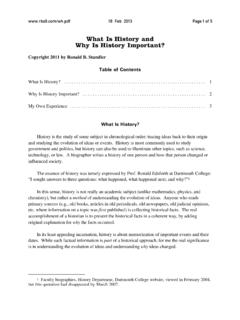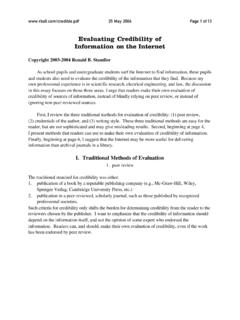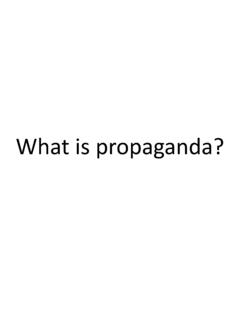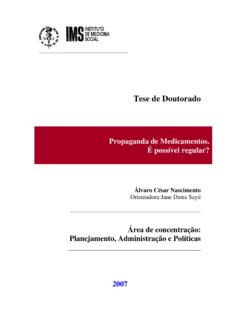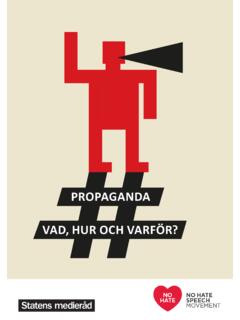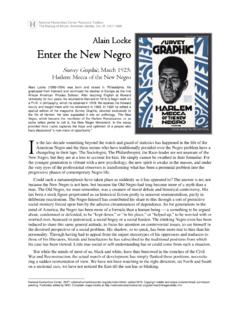Transcription of Propaganda and How to Recognize It - rbs0.com
1 Sep 2005 Page 1 of 12 Propagandaand How to Recognize ItCopyright 2005 by Ronald B. StandlerKeywordsband wagon, bandwagon, card stacking, conventional, enemy, extremist, glitteringgenerality, group, groups, label, name calling, pejorative labels, plain folks,political, Propaganda , rhetoric, technique, techniques, testimonial, transfer,us vs. themTable of ContentsIntroduction .. 21. Name-Calling .. 32. Glittering Generality .. 43. Transfer .. 44. Testimonial .. 55. Plain Folks .. 66. Card Stacking .. 67. Bandwagon .. 6 Insisting on a Binary Choice .. 7 Pejorative Labels .. 7 extremist.
2 8anti-intellectualism .. 9 Bibliography .. 10 Conclusions .. Sep 2005 Page 2 of 12 IntroductionRhetoric is the art of persuading someone. Unless you live as a hermit, totally isolated frompeople, rhetoric is a vital skill. Propaganda is a subset of rhetoric, in which the speaker/writerattempts to manipulate the audience with emotion or fallacious common theme in Propaganda is the us vs. them posturing, in which the speaker/writerencourages you to join with reasonable people and oppose the enemy. The us vs. them posturingis particularly damaging to society, in that it is inherently divisive and erects barriers to workingtogether to solve problems that affect everyone.
3 In July 2005, I wrote a short essay with advice forstudents,1 in which I condemned the human tendency to think 2 in terms of membership ingroups, like a pack of wolves. About a week after writing that short essay, it suddenly occurred tome that most of the common Propaganda techniques depended on group membership for theireffect, and this essay quickly is commonly found in speeches and writings of politicians and lawyers, as wellas in advertising. In other words, Propaganda is commonly used by experts in convincing of Propaganda s appeal to emotion, use of fallacious reasoning, and appeal tomembership in groups, Propaganda appeals to an audience that is either irrational or next seven sections discuss the classic Propaganda techniques identified by the Institutefor Propaganda Analysis during the years 1937-1942.
4 In this discussion, I return continually tothe basic theme that the intent of Propaganda is to divide the world into two groups: us ( , thespeaker/writer of the Propaganda who is endorsing a product) and them ( , the enemy). When I say product , I mean the word to apply broadly to political candidates, legislativeproposals, government policy, as well as tangible products in the marketplace. The audience isencouraged by Propaganda to be one of us, and not one of them. Or, sarcastically, in the strugglebetween the us and them, us is Lessons That I Have Learned, (July 2005).2 I put think inside quotation marks, because it is not genuine thinking to react automaticallyaccording to a group s Sep 2005 Page 3 of 12 1.
5 Name-CallingName calling is such an ancient Propaganda technique that it is frequently identified by itsLatin name, ad hominem attack. For example, a politician who supports law-and-order couldcriticize his opponent as a card-carrying ACLU member . A politician who disagrees with ajudge can label him/her as a liberal activist judge . The epithet can be emphasized by frequent,repeated use. For example, using the phrase liberal activist judge every time one refers to ajudge will have some members of the audience wanting to lynch the judge by the end of particularly vicious example of name calling is to compare one s opponent to In my opinion, such a comparison should never be used without specific reasons to support such acomparison.
6 And even with specific reasons, such a comparison may be too inflammatory forrational way to denigrate someone is to call them unprofessional . There can be no doubtabout legitimate ethical codes promulgated by professional societies, and that behaving ethically(or professionally) is better than behaving unethically (or unprofessionally). However, I observethat the common use of the word professional is to compliment someone and the common useof the word unprofessional is to insult one s opponent neither of which common usesinvolve professional ethics, but are only name politician sometimes denounces special-interest groups , which really means thoseinterests are not the speaker s interests.
7 This criticism of special-interests groups is often morethan name calling, the speaker seems offended that these special interests are allowed toparticipate in the political of the strong negative connotation of the word Propaganda , that word can be usedin name calling: we give you information, they give you and ridicule often accompany name As I was writing the early drafts of this essay, I saw an editorial that criticized ethicaldiscussions or health policy discussions that assert: If X is done, then we are on the road to NaziGermany. Arthur L. Caplan, Misusing the Nazi Analogy, Science, Vol. 309, p. 535, 22 July Sep 2005 Page 4 of 12 2.
8 Glittering GeneralityIn name calling, one pastes a pejorative label on the enemy. In glittering generalities, onepastes a virtuous label on the desired product. There are many examples of words that are used asglittering generalities, such as mentions of civilization, Christian, courage, democracy, dignity, duty, fairness, freedom, glory, good,heroes, honesty, honor, justice, liberty, love, loyal, patriot, peace, scientific, of these words has legitimate uses, but sprinkling them in text for emotional effect ispropaganda. The legitimate use of these words is often to express a conclusion that is supportedwith reasons, while in Propaganda these words express a mere assertion.
9 The use of glitteringgeneralities in Propaganda is intentionally vague, so that the audience provides its owninterpretation of these virtuous good example of glittering generality is to call our method scientific . For example, thestudy of government operations was formerly in a government department or civics class, but isnow known as political science. As someone who was educated as a physicist, I look at so-called political science and say there is nothing scientific about it. A political scientist might reply thatit is a social science , to distinguish it from the real sciences ( , physics, astronomy, chemistry,biology, and mathematics).
10 This is all just a game with words. Calling something a science doesnot make it I see food advertised as all natural or 100% organic (more glitteringgeneralities), I think to myself that feces are also all natural and I sure don t want to eat them.<laughing> The Truth is that something that is produced in a chemical factory is often more purethan some product of nature. 3. TransferAnother effective Propaganda technique is to transfer the prestige, authority, or virtue of somegroup to the product that is being promoted. The common way to do the transfer is to prominentlydisplay a symbol ( , the flag) or to have an organization make an endorsement.
